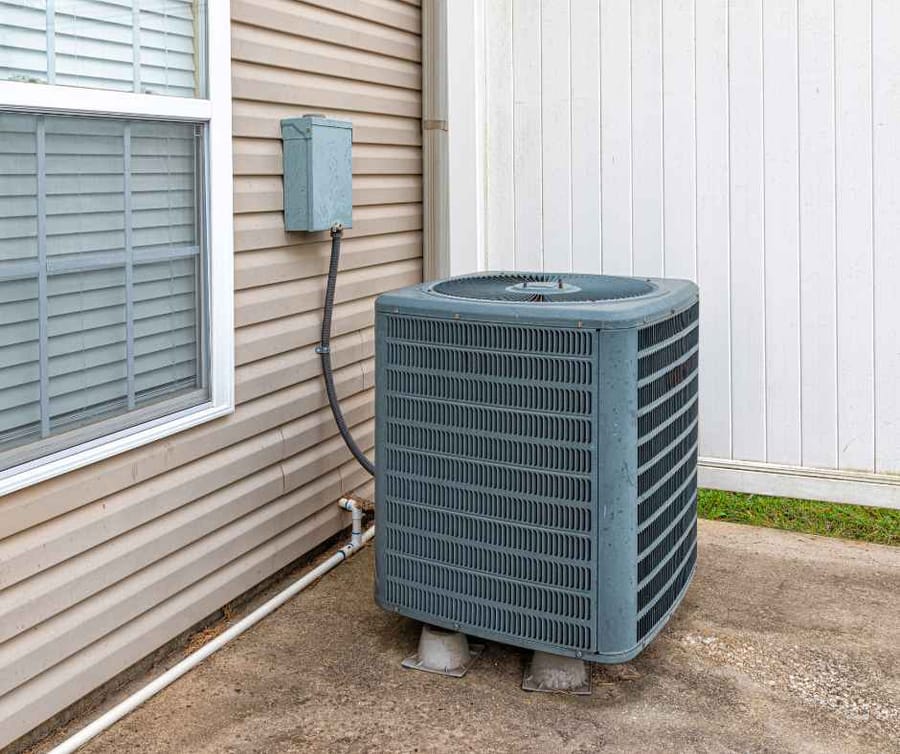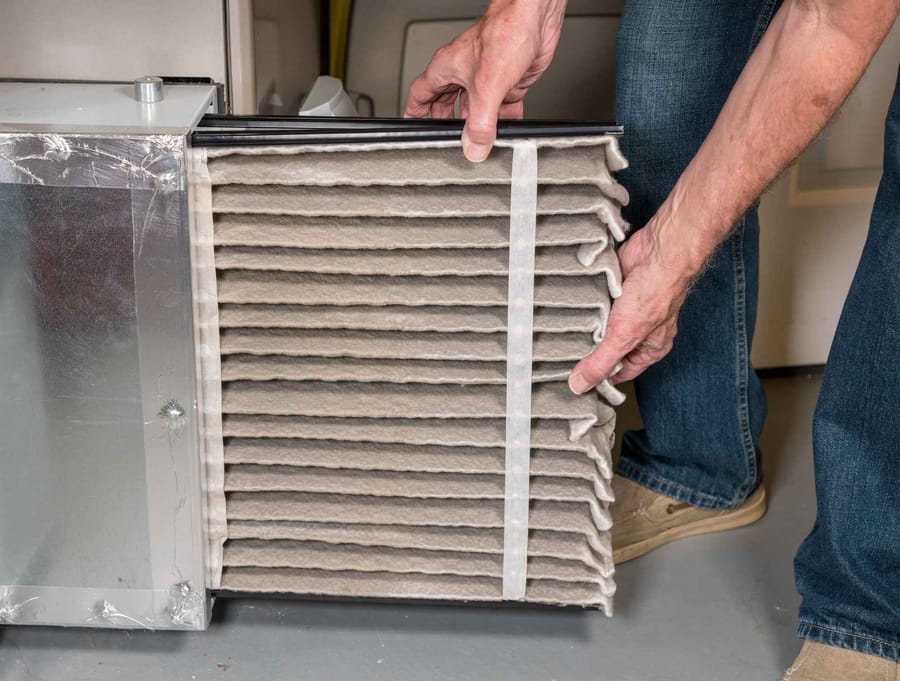4.9 Google Rating
Why Does My AC Keep Freezing?

Ever walked past your air conditioner only to spot a layer of ice where there definitely shouldn’t be one? A frozen AC unit is more than just puzzling—it’s a sign that your system isn’t running the way it should. For homeowners trying to stay cool during the hottest days, this can quickly turn into a comfort and repair nightmare. An air conditioner that keeps freezing up can lead to reduced airflow, inefficient cooling, and serious mechanical damage if ignored. The good news? You don’t have to be an HVAC pro to understand what’s going wrong.
In this blog, we’ll break down the reasons your AC keeps freezing, how to recognize the signs early, and what you can do to fix and prevent the issue.
What Does It Mean When Your Air Conditioner Freezes Up?
If your air conditioner is freezing up, you’re likely to see ice forming on the evaporator coils, refrigerant lines, or even the outdoor unit itself. While that layer of ice might look harmless, it’s actually a red flag. A frozen AC unit means that your system isn’t properly balancing airflow and refrigerant, which disrupts the cooling cycle entirely. This imbalance causes the temperature inside the coils to drop too low, resulting in condensation freezing instead of draining away.
A frozen air conditioner often struggles to cool your home, shuts off unexpectedly, or leaks water indoors once the ice melts. It’s a common issue during peak cooling months but can happen anytime the unit is running under poor conditions. Left unaddressed, freezing can lead to severe damage, including compressor failure—a repair that’s costly and sometimes not worth the investment. Understanding what this means is the first step toward getting your HVAC system back on track.
Key Signs and Common Causes of a Frozen AC Unit
Understanding why your air conditioner freezes up starts with identifying the symptoms and what causes them. A frozen AC isn’t always obvious at first—but the sooner you catch it, the better your chances of avoiding serious damage or high energy bills. Below, we’ll cover the most common signs that your air conditioning system is freezing and explain the underlying causes that could be to blame.
Common Signs Your AC Unit Is Freezing
Watch for these red flags that your AC is freezing up:
-
Ice on Refrigerant Lines or Coils: Visible frost or ice buildup near the indoor unit or refrigerant lines is a clear sign something is wrong.
-
Warm Air from Vents: If the system isn’t cooling properly, frozen coils could be restricting heat transfer.
-
Water Leaks Around the Unit: As the ice melts, water may drip around the air handler or floor.
-
Weakened Airflow: Reduced airflow through your vents often indicates a clogged system or iced-over components.
-
Unusual Noises: Hissing or bubbling sounds could point to refrigerant issues that contribute to freezing.
-
Short Cycling: If your system turns on and off frequently without reaching the desired temperature, it might be freezing during operation.
Why Your Air Conditioner Keeps Freezing Up
Several common issues can cause your AC system to freeze. Here are the most frequent culprits:
-
Restricted Airflow: Dirty air filters, blocked supply vents, or dust-covered evaporator coils prevent warm air from reaching the coils, which leads to freezing.
-
Low Refrigerant Levels: When refrigerant leaks out, the pressure in your system drops, lowering the coil temperature and triggering freeze-ups.
-
Faulty Thermostat: If your thermostat allows the unit to run constantly, it can overcool the coils and cause ice to form.
-
Blower Motor Issues: A broken or sluggish blower fan means warm air isn’t moving through the system fast enough, encouraging freezing.
-
Cool Outdoor Temperatures: Running the AC when outside temps are too low—typically under 60°F—can reduce refrigerant pressure and promote icing.
How to Fix a Frozen Air Conditioner
Once you’ve spotted the warning signs and suspect your air conditioner is frozen, it’s important to act quickly. Letting a frozen AC unit continue to run can do long-term damage to critical components like the compressor. Fortunately, there are a few steps homeowners can take to address the problem, along with knowing when it’s time to call in the pros.
DIY Solutions for a Frozen AC Unit
Before you pick up the phone, try these quick fixes to resolve minor AC freeze-ups:
-
Shut Off the System: Turn off the AC immediately to stop further freezing, and set the fan to “On” to help circulate air and melt the ice faster.
-
Replace the Air Filter: A clogged filter restricts airflow and is one of the most common causes of freezing.
-
Clear Air Vents and Returns: Make sure nothing is blocking airflow throughout your home—furniture, drapes, or closed vents can all contribute.
-
Inspect the Outdoor Unit: Remove leaves, dirt, or debris around the condenser to improve ventilation and system performance.
-
Allow the System to Thaw Completely: Don’t rush to restart the AC. Wait until all ice is fully melted and water has drained before turning the cooling back on.
When to Call a Professional HVAC Technician
Some issues go beyond what DIY fixes can solve. Call an HVAC expert if:
-
The AC freezes again soon after thawing. This likely means there’s an underlying problem that wasn’t addressed.
-
You suspect a refrigerant leak. Low refrigerant levels can’t be fixed at home and must be handled by a licensed professional.
-
The blower fan isn’t working. If air isn’t moving across the coils, you need a technician to inspect the motor or fan blades.
-
There are electrical issues. Tripped breakers, unresponsive thermostats, or flickering power suggest deeper mechanical or wiring problems.
-
The system is still blowing warm air or short cycling. These could be signs of thermostat malfunctions or compressor trouble.
Tips to Prevent Your AC Unit from Freezing Again
Once you’ve resolved a frozen AC issue, the next step is making sure it doesn’t happen again. A little prevention goes a long way when it comes to keeping your air conditioner running smoothly—especially during peak cooling season. Regular maintenance, clean filters, and smart usage habits can all help stop freezing problems before they start.
Follow these AC maintenance tips to avoid frozen coils and system breakdowns:
-
Change Your Air Filter Regularly: Replace it every 1–3 months to maintain proper airflow and prevent dust buildup on your evaporator coils.
-
Keep Supply and Return Vents Open and Unblocked: Closed or obstructed vents restrict air movement and can lead to coil freezing.
-
Schedule Routine HVAC Tune-Ups: Have a professional inspect your system twice a year—once before summer, once before winter—to catch small problems early.
-
Avoid Running Your AC in Cool Outdoor Temperatures: Don’t use the cooling function if it’s below 60°F outside. Instead, use ceiling fans or open windows.
-
Monitor Your Thermostat Settings: Set your temperature to a consistent level. Avoid drastic drops that force your system to overwork and risk freezing.
-
Watch for Unusual Changes: Higher energy bills, weak airflow, or strange noises can indicate issues that might lead to freezing.
Wrap-Up: Stop Your AC from Freezing With Expert HVAC Help
A frozen air conditioner isn’t just a summer setback—it’s often a sign of deeper issues like poor airflow, refrigerant leaks, or mechanical failure. Ignoring the problem can lead to inefficient cooling, system damage, and higher energy bills. By knowing the warning signs and handling small problems early, you can avoid costly breakdowns and stay comfortable year-round.
Whether your AC just started freezing or the problem keeps coming back, Moss Heating & Cooling is here to help. Our expert HVAC technicians can diagnose the issue, restore your system’s performance, and prevent future freezing with reliable maintenance solutions.
Don’t wait until your system shuts down—contact Moss Heating & Cooling today to schedule your AC service and keep things cool.
Recent News

DFW Energy Saver Tips for Your Heating System

Why Is My Heater Blowing Cold Air? Dallas Homeowner Troubleshooting Guide
